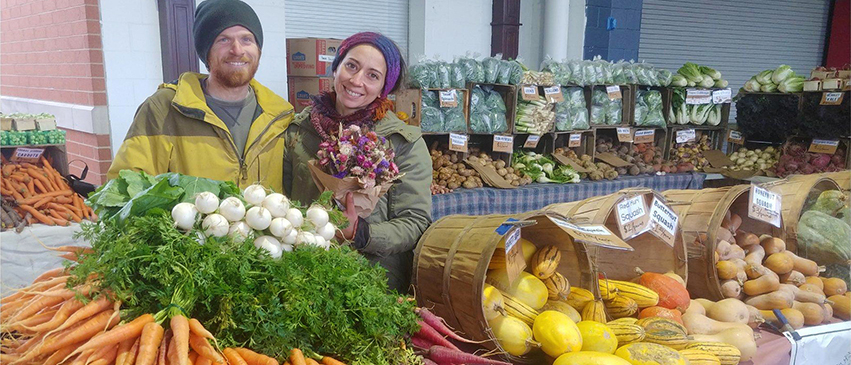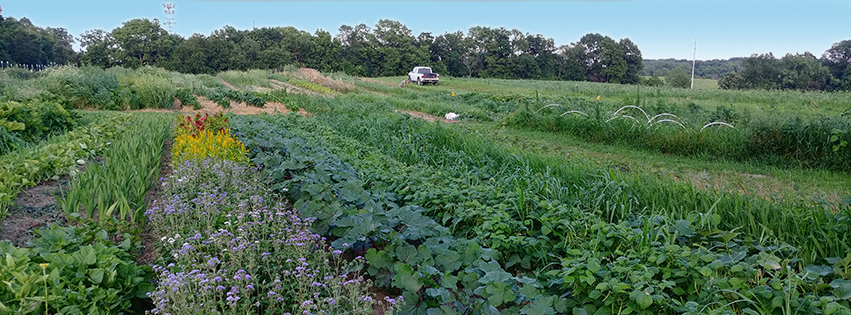In Love and Farming

Nestled down a dusty drive, past soybean and corn fields, sits a Civil War-era farmstead, unseen from its address post on Springfield Road. This East Peoria plot is home to Kira Santiago and Evan Barry, the farmers behind Kira’s Flowers and Down River Farm. The two joined forces in 2017 to farm a biodiverse, regenerative system of organic food and flowers. Maybe you’ve seen their farmstand at the Peoria RiverFront Market, abundant with colorful produce and flowers. Less visible to the public is the history that brought each farmer to the same plot of land, and the intentionality with which they cultivate it.
A Family of Farmers
Kira grew up working on farms while swearing she’d never be a farmer. From her great-grandfather’s farm in Danforth, Illinois came a long line of successful farmers. Kira’s mother, Teresa Brockman, started an organic fruit and herb farm in Eureka in 2000—you can often find her herbs, jams and teas alongside Kira’s flowers and Evan’s vegetables at the local markets. Another well-known organic vegetable operation, Henry’s Farm, is run by Kira’s uncle, Henry Brockman, who became one of the first farmers in the area to introduce Community Supported Agriculture (CSAs) when he started farming in Congerville in the early 1990s.
Kira remembers complaining incessantly about chores on her mom’s farm, and playing in the fields on her uncle’s farm without providing much help. It wasn’t until after studying art and graphic design and moving to Boston that the fertile soil of central Illinois began calling her home. Kira began renting and working the land on the East Peoria farmstead from a family friend in 2014, eager to blend her artistic and agricultural backgrounds. Meanwhile, after farming for 10 months in Asheville, North Carolina and a year on farms throughout South America, Evan sought work closer to his Chicagoland home. The devotion of Kira’s uncle Henry to the health of both the soil and the community is what drew Evan to work for him as a farmhand in 2017.

Complementary Relationships
From the fields of Henry’s Farm, Kira and Evan discovered a relationship built on shared interests including travel, music and of course, small-scale, sustainable farming. “Not everyone can be a farmer, but I could tell Evan had it in him,” Kira reminisces. After farming alone for three years, she was happy to have him move in and work the land alongside her as he laid plans for Down River Farm.
The soil and crops have also been happier since the couple’s romantic and professional merger. Between the two of them, the farm is home to 500 varieties of plants, creating a balanced and resilient ecosystem that mimics nature. This kind of variety deters certain pests from being able to find the crop they’re looking for, while attracting other beneficial bugs. A bird that might eat kale has a hard time spotting it between the rows of tomatoes and cosmos, but a bee that helps pollinate flowering vegetables is drawn in by the nearby wildflowers. Evan emphasizes crop diversity as a practice that helps the couple “farm smarter, not harder.”
Teaming up has also given new life to the soil. The land, which previously produced corn and soybeans, saw the common effects of large-scale machinery, tillage and chemical practices: compacted soil with scant signs of microbial life. Working together, the two have been able to see the life-giving results of mindful tillage and locally purchased organic compost amendments. What was hard, anaerobic soil when Kira moved in gets closer each year to the desired texture of chocolate cake.
Slow, Smart Growth
Kira and Evan have found enthusiastic customers through their CSAs and markets who understand not only the importance of locally grown, organic food, but why flowers should be held to the same standards. Chemical regulations in the flower industry are even more lax since they aren’t ingested, resulting in the poor health of the environment and farmworkers globally.
Through farm tours, open houses, yoga, live music and farm-to-table dinners in one of the area’s last standing Sears Roebuck barns, the public is able to explore the farm as well. Perhaps most impressive upon visiting is how productive Kira and Evan have been on just two acres. And that’s the whole point. The less land they have to work with, the more efficient and creative they can be in employing regenerative practices.
Over the next few years, they’d like to bring more animals onto the land to rotate through pastures along with the vegetables and flowers, contributing natural fertilizer to the process. You can expect their two businesses to grow in efficiency, not expansion, as the couple plans to continue living by Kira’s adage: “Do as much as you can with as little as you can for as long as you can.” PM
To learn more, visit kirasflowers.com and downrivervegetablefarm.com.
- Log in to post comments

